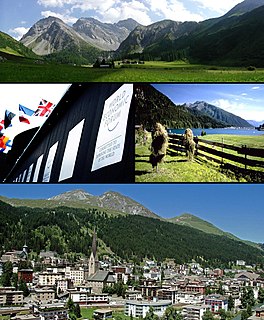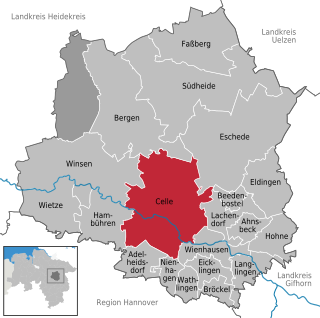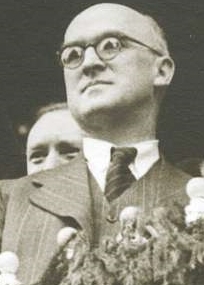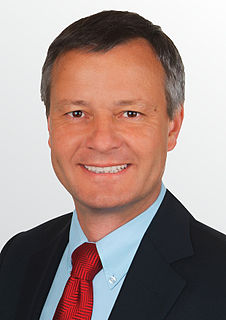Related Research Articles

Nikolaus "Klaus" Barbie was a Nazi, known as the "Butcher of Lyon" for having personally tortured prisoners of the Gestapo—primarily Jews and members of the French Resistance—while stationed in Lyon under the collaborationist Vichy regime. After the war, United States intelligence services employed him for his anti-Marxist efforts and also aided his escape to Bolivia.

Lower Saxony is a German state (Land) situated in northwestern Germany. It is the second-largest state by land area, with 47,624 km2 (18,388 sq mi), and fourth-largest in population among the 16 Länder federated as the Federal Republic of Germany. In rural areas, Northern Low Saxon and Saterland Frisian are still spoken, but the number of speakers is declining.

Davos is an Alpine resort town and a municipality in the Prättigau/Davos Region in the canton of Graubünden, Switzerland. It has a permanent population of 10,862 (2019). Davos is located on the river Landwasser, in the Rhaetian Alps, between the Plessur and Albula Ranges.
In many countries, a mayor is the highest-ranking official in a municipal government such as that of a city or a town. Worldwide, there is a wide variance in local laws and customs regarding the powers and responsibilities of a mayor as well as the means by which a mayor is elected or otherwise mandated. Depending on the system chosen, a mayor may be the chief executive officer of the municipal government, may simply chair a multi-member governing body with little or no independent power, or may play a solely ceremonial role. A mayor's duties and responsibilities may be to control municipal workers, provide basic governmental services to constituents, and execute the laws and ordinances passed by a municipal governing body. Options for selection of a mayor include direct election by the public, or selection by an elected governing council or board.

Celle is a town and capital of the district of Celle, in Lower Saxony, Germany. The town is situated on the banks of the river Aller, a tributary of the Weser and has a population of about 71,000. Celle is the southern gateway to the Lüneburg Heath, has a castle built in the Renaissance and Baroque style and a picturesque old town centre with over 400 timber-framed houses, making Celle one of the most remarkable members of the German Timber-Frame Road. From 1378 to 1705, Celle was the official residence of the Lüneburg branch of the dukes of Brunswick-Lüneburg who had been banished from their original ducal seat by its townsfolk.

Wolfsburg is the fifth largest city in the German state of Lower Saxony, located on the Aller River. It lies about 75 km (47 mi) east of Hanover and 230 km (143 mi) west of Berlin.

Erich Neumann was a Nazi politician.

Amelinghausen is a municipality in the district of Lüneburg in Lower Saxony, Germany. It is also the seat of the collective municipality (Samtgemeinde) of Amelinghausen.

Adolf Bruno Heinrich Ernst Heusinger was a German military officer, whose career spanned the German Empire, the Weimar Republic, Nazi Germany and West Germany. Heusinger joined the German Army as a volunteer in 1915 and later became a professional soldier. He served as the commander in chief of the general staff of the High Command of the German Army in the Nazi German Armed Forces from 1937 to 1944, consequently being appointed chief of general staff for 2 weeks in 1944 after his predecessor abandoned his post due to a nervous breakdown. He was then appointed head of the military cartography office when the war ended. He later became a general for West Germany and served as head of the West German military from 1957 to 1961 as well as Chairman of the NATO Military Committee from 1961 to 1964.

The Evangelical-Lutheran Church of Hanover is a Lutheran church body (Landeskirche) in the northern German state of Lower Saxony and the city of Bremerhaven covering the territory of the former Kingdom of Hanover.

Gebhard Müller was a German lawyer and politician (CDU). He was President of Württemberg-Hohenzollern (1948–1952), Minister President of Baden-Württemberg (1953–1958) and President of the Federal Constitutional Court of Germany (1959-1971). He was born in Füramoos and died in Stuttgart.

Magnus Alexander Maximilian Freiherr von Braun was a German civil servant and conservative politician whose career spanned the German Empire, World War I and the Weimar Republic. He served as the Federal Minister of Nutrition and Agriculture from 1 June 1932 to 28 January 1933.

Friedrich Wilhelm Bernhard von Berg, also von Berg-Markienen, was a German politician and chairman of the Secret Civil Cabinet of Kaiser Wilhelm II in 1918.

Bernd Lange is a German politician and member of the European Parliament from Germany. He is a member of the Social Democratic Party, part of the Party of European Socialists.

Henning Otte is a German politician and member of the Christian Democratic Union of Germany (CDU).
Manfred Ostermann is a German local politician and an independent. In 2007 he was elected as the chief executive (Landrat) of the district of Soltau-Fallingbostel for an initial term of 8 years.

Dirk-Ulrich Mende is a German SPD politician and was the Lord Mayor (Oberbürgermeister) of the town of Celle in North Germany.

Böddenstedt is a village in the municipality of Suderburg in the collective municipality of Suderburg and lies in southwest of the district of Uelzen in the German state of Lower Saxony.

Karl-Heinz Schröter is a German politician. He is the current State Minister of the Interior government of Minister-President Dietmar Woidke of Brandenburg. He previously served as district administrator of the Oberhavel district and was a member of the twelfth German Bundestag.

Klaus Riegert is a German politician (CDU).
References
- 1 2 Der Landrat des Landkreises Celle at www.landkreis-celle.de. Accessed on 16 Apr 2011.
- ↑ Klaus Wiswe at www.klaus-wiswe.de. Accessed on 16 Apr 11.